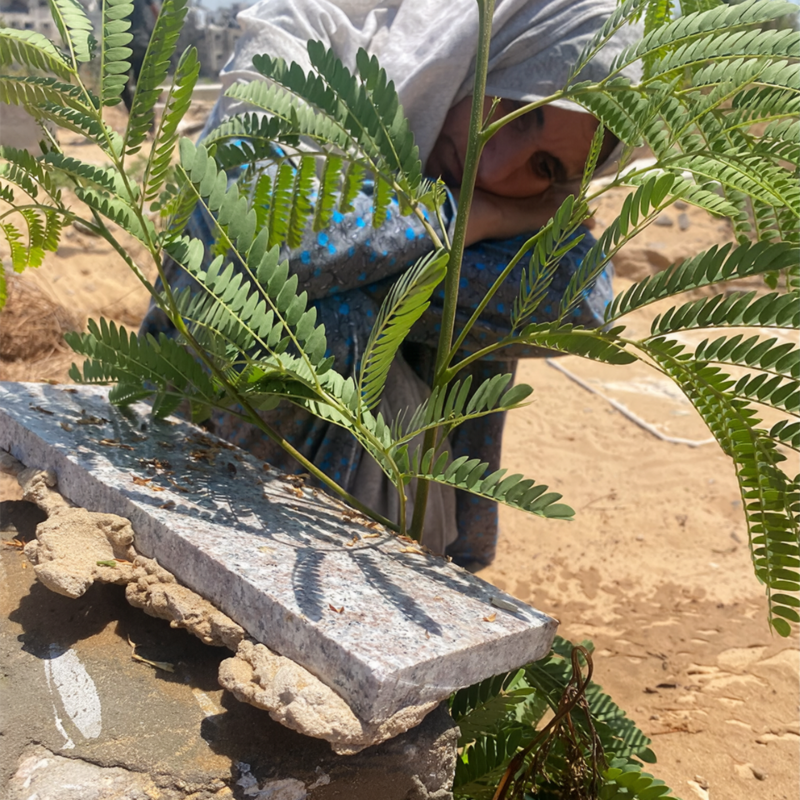The Electronic Intifada 19 June 2024

Rana, 6, and Jana, 10, were killed by an Israeli attack on the school in Beit Lahiya where they had taken shelter.
Last week, I was walking by the Beit Lahiya cemetery when I saw a woman crying at a grave.
I walked over to her and she introduced herself as Nujoud al-Shish. She told me the grave was that of her two daughters, Jana, 10, and Rana, 6.
The girls were killed on 17 November 2023, when Israeli tanks shelled the Tal al-Rabia’ school in Beit Lahiya where the family had been displaced.
The Tal al-Rabia’ school is one of the schools that make up the Tel al-Zaatar complex in Beit Lahiya, and more than 50 Palestinians were killed during that attack.
Nujoud said that on that night, they were sleeping in a classroom on the third floor of the school. Around 10 pm, the occupation tanks began to shell the school. There were also planes above dropping bombs.
A shell was fired into the classroom and wounded Nujoud and her two daughters.
The ongoing Israeli attack meant they could not go to the hospital until dawn. They bled the entire night, and their bodies were covered with wounds and burns from shrapnel. Nujoud’s skin on her arms and hands had melted from the heat of the shrapnel.
Jana and Rana both had severe head injuries. By the time they arrived at Kamal Adwan hospital in Beit Lahiya, the girls were unconscious. Due to overcrowding at that hospital, they were transferred to the Indonesian hospital.
At the end of the day, Jana’s and Rana’s hearts stopped beating, and they died as martyrs. As for Nujoud, still being treated for her injuries, nobody could bring themselves to tell her that the girls were dead.
She was told they were still receiving treatment.
Under siege at the Indonesian hospital
The next day, her son-in-law told her that the girls had died. She accused him of lying; she was in disbelief.
“Why do you say that about them?” she asked him. “They loved you so much. Don’t say that about them. They are alive and receiving the necessary treatment.”
They buried the girls in white shrouds in the hospital yard, as there was no chance of reaching a cemetery with the Israeli military’s attacks on the area.
Nujoud was still in the Indonesian hospital when it was besieged and attacked by the Israeli occupation forces.
She was trapped inside the hospital for six days, taking cover in the corridor, with minimal food or water.

Nujoud al-Shish visits her daughters’ grave that they share in Beit Lahiya. The girls were first buried at the Indonesian hospital, but they were transferred to the cemetery.
When it was possible to leave the hospital without being directly targeted and killed by Israeli forces, the doctors tried to transfer Nujoud to a hospital in the south.
Her physical condition had deteriorated, and she still had shrapnel in her body.
But Nujoud refused to go south.
“I would have gone,” she said, “but after [my daughters] preceded me to their merciful Lord, I will not leave the north until I die.”
Has the occupation dug up my daughters’ graves?
Nujoud eventually found herself at al-Shifa hospital, where she received treatment for her worsening wounds. The doctors at al-Shifa told her that if the burn wounds on her hands were not treated immediately, gangrene might develop and they would have to amputate her hands.
The family eventually set up a tent on the grounds of the al-Shifa medical complex, where they remained until March 2024, when the Israeli occupation forces laid siege to the hospital for a second time.
They returned to Beit Lahiya then, and Nujoud had only one thought on her mind: Had the Israeli occupation dug up her daughters’ graves?
She was reassured by the hospital staff that the grave was intact and that their bodies would be transferred to the Beit Lahiya cemetery.
Nujoud returned to the classroom where her daughters’ blood had been shed. Their blood was still on the floor, and she took a piece of cloth to collect what remained of it, to keep her daughters near her.
“I imagine them with me everywhere,” she said. “I wake up hearing their voices telling me, ‘Come on, make us breakfast.’”
She visits their grave every Thursday because that was the day they would go to the market for chocolate and new clothes.
“Rana was hoping to go to school and wear the school uniform,” she said. “Thank God she was able to wear it and do what she wished for.”
Asil Almanssi is a writer based in Gaza.





